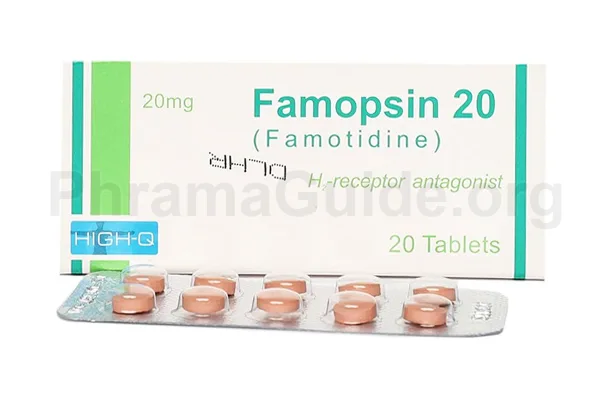Famopsin tablet is primarily used for the treatment and management of gastrointestinal issues like heartburn and indigestion. It belongs to the class of histamine-2 (H2) receptor antagonists. Following are some common uses of Famopsin Tablet:
- Gastroesophageal Reflux Disease (GERD): Famopsin tablet is commonly used to reduce the symptoms of GERD, a condition in which stomach acid flows back into the esophagus, causing heartburn, acid regurgitation, and discomfort. It helps by reducing the production of stomach acid, thereby providing relief from symptoms and promoting the healing of the esophagus.
- Peptic Ulcer Disease (PUD): Famopsin tablet is also used to treat and prevent peptic ulcers, which are open sores that develop on the lining of the stomach or the upper part of the small intestine. It helps to reduce stomach acid production, allowing the ulcers to heal and preventing the recurrence of ulcers.
- Zollinger-Ellison Syndrome: Famopsin tablet is also used for the treatment of Zollinger-Ellison syndrome, a rare condition characterized by the overproduction of stomach acid. By inhibiting the production of acid, Famopsin helps manage the symptoms associated with this syndrome.
- Non-Ulcer Dyspepsia: Famopsin tablets may be used to relieve the symptoms of non-ulcer dyspepsia, a condition characterized by chronic or recurrent pain or discomfort in the upper abdomen without evidence of an ulcer or other digestive disorders.
- Prevention of Acid-Related Damage: Famopsin tablet is sometimes used to prevent damage caused by stomach acid, such as in individuals who need to take non-steroidal anti-inflammatory drugs (NSAIDs) or have a history of gastric bleeding.
Off-label Uses of Famopsin Tablet
- Allergic Conditions: Famopsin tablets may be used off-label to help manage symptoms of certain allergic conditions, such as allergic rhinitis (hay fever) or urticaria (hives). It can help reduce allergic reactions by decreasing the release of histamine in the body.
- Chemotherapy-Induced Nausea and Vomiting: Famopsin tablets may be used as part of combination therapy to help prevent or alleviate chemotherapy-induced nausea and vomiting. It can help reduce the production of stomach acid, which can contribute to these symptoms.
- Eosinophilic Esophagitis: It (Eosinophilic esophagitis) is a chronic immune-mediated disorder of the esophagus. Famopsin tablets may be used as part of the treatment regimen to help alleviate symptoms and reduce inflammation in the esophagus.
- Stress Ulcer Prophylaxis: Famopsin tablets may be used for stress ulcer prophylaxis in critically ill patients in intensive care units. It can help reduce the risk of developing stress ulcers, which can occur due to factors such as severe illness, trauma, or major surgeries.

What is Famopsin?
Famopsin is one of the leading brands of Famotidine, manufactured and marketed by High-Q Pharmaceuticals (Pvt) Ltd, Pakistan.
Famopsin Alternatives : Other Similar Brands
The following are some alternative brands of Famopsin and their manufacturers.
- Famot : Shaigan Pharmaceuticals (Pvt) Ltd, Pakistan.
- Apsin : Saffron Pharmaceuticals (Pvt) Ltd, Pakistan.
- Polypep : Wilsons Pharmaceuticals, Pakistan.
- Nocid : Novartis Pharma (Pakistan) Ltd.
- Acicon : Barrett Hodgson Pakistan (Pvt) Ltd.
- Optifam : Merck (Pvt) Ltd.
- Famtaza : Zafa Pharmaceutical Laboratories (Pvt) Ltd, Pakistan.
- Fomen : Sharooq Pharmaceuticals, Pakistan.
- H2F : Ferozsons Laboratories Ltd, Pakistan.
- Ulcenil : Siza International (Pvt) Ltd, Pakistan.
- Femme : Batala Pharmaceuticals, Pakistan.
Famopsin : Available Formulations and Strengths
Presently, Famopsin is available in Tablets Form.
Famopsin Tablets : 20mg and 40mg strengths.
Who Should Not Use Famopsin?
Famopsin has a few contraindications, which are specific circumstances or conditions in which the use of Famopsin is not recommended due to potential risks and adverse effects.
Hypersensitivity: Famopsin is contraindicated in individuals who have a known hypersensitivity or allergy to Famopsin or any of its components. Allergic reactions can range from mild symptoms like rash and itching to severe reactions that require immediate medical attention.
Severe Renal Impairment: Famopsin is contraindicated in individuals with severe renal impairment (kidney dysfunction). In such cases, the dosage of Famopsin may need to be adjusted or an alternative medication may be considered.
Porphyria: Famopsin is contraindicated in individuals with a history of porphyria, a group of rare genetic disorders that affect the production of heme, a component of hemoglobin. Famopsin can potentially trigger a porphyria attack or worsen symptoms in individuals with this condition.
Co-administration with Rilpivirine-Containing Products: Co-administration of Famopsin with rilpivirine, a medication used in the treatment of HIV infection, is contraindicated. Famopsin may reduce the absorption of rilpivirine, potentially leading to reduced efficacy.
What is the Recommended Daily Dosage of Famopsin?
Famopsin Tablets Dose for Heartburn and GERD:
- one tablet of 20mg or 40mg once or twice daily, as directed by your healthcare provider.
Famopsin Tablets Dose for Stomach Ulcers:
- one tablet 40mg once or twice daily, as directed by your healthcare provider.
How Famopsin Works?
Famopsin is a medication that belongs to a class of drugs known as histamine H2-receptor antagonists, or H2 blockers. Its mode of action involves blocking the action of histamine on the H2 receptors in the stomach. By blocking the H2 receptors, Famopsin reduces the production of stomach acid, thus decreasing its secretion into the stomach.

Leave A Comment